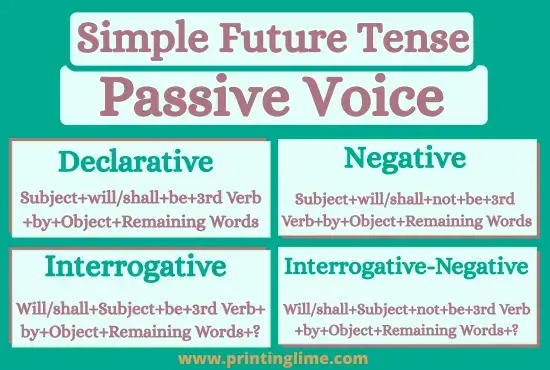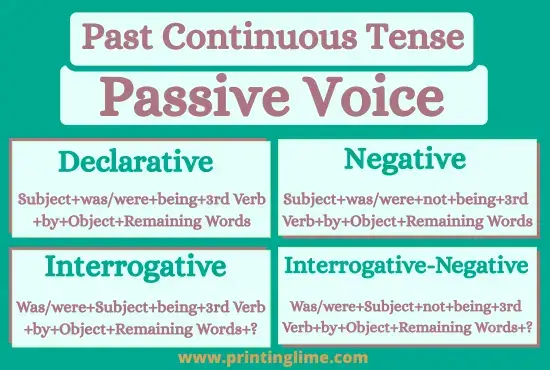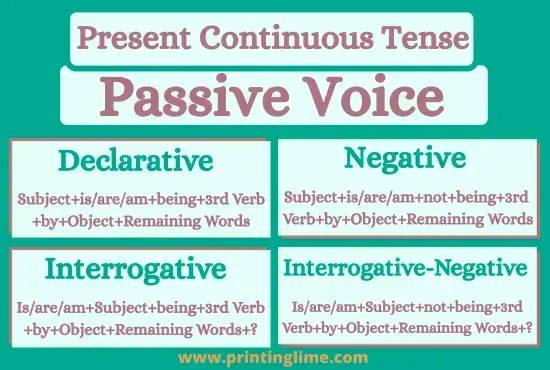Present Perfect Tense (Passive Voice)

Present Perfect Tense (Passive Voice) sentences are used to emphasize present-time completed actions. It uses “has been/have been” as a helping verb with the 3rd verb. You can convert Active Voice Sentences of Present Perfect Tense into Passive Voice Sentences by following the below-mentioned general rules.
Present Perfect Tense Passive Voice Rules
Following are general rules of converting Present Perfect Tense (Active Voice) sentences into Passive Voice.
- At first, convert the Object of ActiveVoice sentences into the Subject of Passive Voice sentences.
- Then use helping verb “has been/have been” according to the singular and plural Subject of Passive Voice sentences.
- Then, use 3rd verb to emphasized on the present completed action.
- After this, use preposition “by”, to show the doer who has performed the action.
- And then, convert the Subject of Active Voice sentences into the Object of passive voice sentences.
- At the end, write the remaining word, if there isany in the Active Voice sentences.
Helping Verbs of Present Perfect Tense Passive Voice
All the Passive Voice sentences of Present Perfect Tense use following 2 helping verbs with 3rd verb.
“Has Been” As Helping Verb in Present Perfect Tense (Passive Voice) Sentences
“Has been” is used as helping verb in Present Perfect Tense (Passive Voice) sentences with singular number of nounsand pronouns. Thus, Present Perfect Tense (Passive Voice) sentences with “has been” have the following general sentence formula.
He/she/it/Singular Noun+ has+ been+ 3rd Verb+ by+ Object+ Remaining Words

Following are some examples of Present Perfect Tense (Passive Voice) sentences with “has been” as the helping verb.
- The committee has chosen him as the team leader.
- He has been chosen by the committee as the team leader.
- The teacher has praised her for her excellent performance.
- She has been praised by the teacher for her excellent performance.
- The mechanic has repaired it.
- It has been repaired by the mechanic.
- They have informed him about the meeting.
- He has been informed by them about the meeting.
- The university has awarded her a scholarship.
- She has been awarded a scholarship by the university.
- A scholarship has been awarded by her by the university.
“Have Been” As Helping Verb in Present Perfect Tense Passive Voice Sentences
“Have been” is used as a helping verb in Present Perfect Tense (Passive Voice) sentences with plural number of nouns and pronouns (I/we/you/they). So, these passive sentences have the following general sentence formula.
I/we/you/they/Plural Noun+ has/have+ been+ 3rd Verb+ by+ Object+ Remaining Words

“Have been” is used as a helping verb in the following Present Perfect Tense (Passive Voice) sentences.
- He has invited me to the annual conference.
- I have been invited by him to the annual conference.
- The manager has given us new assignments.
- We have been given new assignments by the manager.
- New assignments have been given to us by the manager.
- She has taught you this lesson many times.
- You have been taught this lesson by her many times.
- This lesson has been taught to you by her many times.
- The committee has awarded them medals for their bravery.
- They have been awarded medals by the committee for their bravery.
- Medals have been awarded to them by the committee for their bravery.
- The supervisor has told us to complete the project by Friday.
- We have been told by the supervisor to complete the project by Friday.
Present Perfect Tense (Passive Voice) Formula
Following are the sentence formula for Declarative, Negative, Interrogative, and Interrogative-Negative sentences of Present Perfect Tense (Passive Voice).
Declarative Sentence Formula of Present Perfect Tense Passive Voice
Declarative or Assertive Sentences of Present Perfect Tense(Passive Voice) takes “has been/have been” as helping verb with 3rd form of Verb to represent the completed action ofthe present time. Thus, these sentences have the following general sentence formula.

Declarative Sentences of Present Perfect Tense Passive Voice Examples
Following are some examples of declarative sentences of Present Perfect Tense (Passive Voice).
- My mother has warned me about the storm.
- I have been warned about the storm by my mother.
- The company has offered us a new business deal.
- We have been offered a new business deal by the company.
- A new business deal has been offered to us by the company.
- The instructor has taught you how to use this software.
- You have been taught by the instructor how to use this software.
- The organizers have invited them to the charity dinner.
- They have been invited by the organizers to the charity dinner.
- The police have questioned him.
- He has been questioned by the police.
- The director has promoted her to the position of manager.
- She has been promoted by the director to the position of manager.
- The wind has damaged it in the storm.
- It has been damaged in the storm.
- The author has translated the book into five languages.
- The book has been translated by the author into five languages.
- The workers have cleaned the cars.
- The cars have been cleaned by the workers.
- The assistant has sent the documents to the main office.
- The documents have been sent by the assistant to the main office.
Negative Sentence Formula of Present Perfect Tense Passive Voice
Negative Sentences of Present Perfect Tense (Passive Voice) takes “not” after the helping verbs “has/have”, but before “been”. Thus, these negative sentences have the following sentence structural formula.

Negative Sentences of Present Perfect Tense Passive Voice Examples
Following are some examples of Negative Sentences of Present Perfect Tense (Passive Voice).
- My friend has not informed me about the schedule change.
- I have not been informed by my friend about the schedule change yet.
- The couple has not invited us to the wedding ceremony.
- We have not been invited by the couple to the wedding ceremony.
- The supervisor has not given you the final instructions yet.
- You have not been given the final instructions by the supervisor yet.
- The final instructions have not been given to you by the supervisor yet.
- The judges have not selected them for the competition.
- They have not been selected by the judges for the competition.
- People have not seen him in the office this week.
- He has not been seen in the office this week.
- Her brother has not told her the truth about the situation.
- She has not been told the truth by her brother about the situation.
- The truth has not been told about the situation by her brother.
- The mechanic has not repaired it properly.
- It has not been repaired by the mechanic properly.
- The team has not completed the report on time.
- The report has not been completed by the team on time.
- The technician has not serviced the machines this month.
- The machines have not been serviced by the technician this month.
- The postman has not delivered the letters yet.
- The letters have not been delivered by the postman.
Interrogative Sentence Formula of Present Perfect Tense Passive Voice
Interrogative Sentencesof Present Perfect Tense(Passive Voice) takes “has/have” at the start of sentences, and “been” comes after the subject of the passive voice sentence. So, these interrogative sentences have the following general sentence structural formula.

Interrogative Sentences of Present Perfect Tense Passive Voice Examples
Following are some examples of Interrogative Sentences of Present Perfect Tense (Passive Voice).
- Has the committee chosen me for the scholarship?
- Have I been chosen for the scholarship by the committee?
- Has the manager told us about the new rules?
- Have we been told by the manager about the new rules?
- Have they invited you to the conference?
- Have you been invited by them to the conference?
- Has the administration given them access to the files?
- Have they been given access to the files by the administration?
- Has the company promoted him to a higher position?
- Has he been promoted by the company to a higher position?
- Has her manager informed her about the changes?
- Has she been informed by her manager about the changes?
- Has the cleaner cleaned it properly?
- Has it been cleaned by the cleaner properly?
- Has the director approved the documents?
- Have the documents been approved by the director?
- Has the curator displayed the painting in the gallery?
- Have the paintings been displayed by the curator in the gallery?
- Has the assistant sent the messages to the clients?
- Have the messages been sent by the assistant to the client?
Interrogative-Negative Sentence Formula of Present Perfect Tense Passive Voice
Interrogative-Negative Sentences of Present Perfect Tense (Passive Voice) takes “has/have” at the start of sentences and “not been ” comes after the subject. Thus, these interrogative-negative sentences have thefollowing general sentence structural formula.

Interrogative-Negative Sentences of Present Perfect Tense (Passive Voice) Examples
Following are some examples of Interrogative-Negative sentences of Present Perfect Tense (Passive Voice).
- Has the manager not considered me for the position?
- Have I not been considered by the manager for the position?
- Has the committee not invited us to the annual event?
- Have we not been invited to the annual event by the committee?
- Has he not informed you about the decision yet?
- Have you not been informed by him about the decision yet?
- Has the company not given them their salaries this month?
- Have they not been given their salaries by the company this month?
- Have their salaries not been given to them by the company this month?
- Have people not seen him around lately?
- Has he not been seen around by the people lately?
- Have they not told her about the meeting?
- Has she not been told by them about the meeting?
- Has the mechanic not repaired it?
- Has it not been repaired by the mechanic?
- Has the team not completed the project on time?
- Has the project not been completed by the team on time?
- Has the travel agent not booked the tickets yet?
- Have the tickets not been booked by the travel agent yet?
- Has the assistant not sent the emails to the clients?
- Have the emails not been sent by the assistant to the clients?






